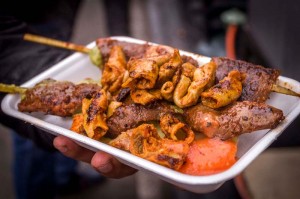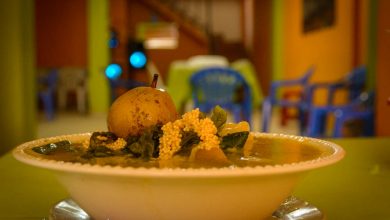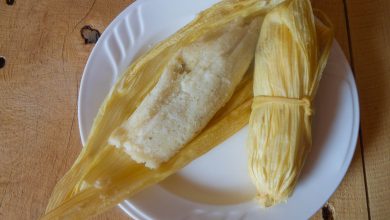Skewers with Peruvian Heart, Anticuchos

To the rhythm of Peruvian Creole music, flames soar upward on an anticucho grill. The scent that fills the air, when sticks of meat are place over the coals, makes us fall in love with them and want to try them. Their flavor fills us with joy. Anticuchos claim Lima’s nights, bringing ecstasy to all.
As the word tells us, anticuchos date from Inca times and before. It is not a Spanish word, though the Spanish have their version of skewers, as do all the people of the Mediterranean.
The word comes from Quechua, the main indigenous language of Peru. It either means cuts (of meat) from the eastern lands, (the mountains and lowland jungles), or it means a spicy food from there.
In her book Vocabulario de la Cocina Limeña (The Vocabulary of Lima’s Cuisine) Aída Tam Fox specifies that anti means in front of the cut, or cuchu. At the same time, the linguist Noé Lara in his article “El criollísimo anticucho” (The Very Creole Anticucho) published in El Peruano wrote that anticucho comes from uchu, hot Peppers, and anti, Andes.

Anti is the word from which we get the name of Peru’s mountains, the Andes, and referred in Inca times to the northeastern quadrant of the empire of four parts, Tawantinsuyo, at the same time it referred to everything beyond the high passes, often surrounded by glaciate peaks, that opened onto the world of jungle.

In classic mythology this was the world of the past and future, the place where the Inca has retreated to and from which he someday will return.
Perhaps deliberately, and perhaps not, the pieces of meat on the stick do remind one of the shapes of mountains and hills.
Before the Spanish, and in rural areas still today, this delight was made with llama meat. It was cut into pieces. They were seasoned with a mix of hot peppers (ajíes or uchu-kuna) and wild herbs. Once the Spanish brought beef, it tended to replace the llama meat and garlic also became part of the seasoning.
The Spanish had the custom of marinating beef in wine and other seasoning. Then they would fry it and put it on sticks like brochettes.
As many Peruvians have commented, the Spanish would only eat beef muscles, and not organ meats. As a result, the poorer people and those of lower social status ate the innards. These included Moors, Blacks, and others who then made them part of their fare.
In this way, this fantastic dish came into existence. It relies on beef heart, rather than muscle, which has a superior taste, compact texture, and is tender.

Once the beef heart was cut into pieces they marinated it with chicha and later with vinegar. Small, cane sticks became used to cook the meat on the grill and to enable one to eat it.
This amazing dish is typically found on street corners where it is hand made by a robust woman of dark complexion. In one hand she carries a brush made from cornhusks that she submerges in a mixture of oil and seasonings and then brushes it across the cooking meat, causing flames to spring up. As a result, the anticuchos do not only get cooked, they get smoked.
The marinade for the meat consists of a mixture of ajíes (hot Peppers) from the north, vinegar, and dry seasonings. The meat is submerged in it and left for two hours. (People used to leave it for a whole day, but the meat would lose its moisture because of the prolonged contact with the salt.
After the meat is marinated you take three of four pieces and skewer them on a cane stick. Then you place them over a hot grill. You serve them with potatoes, sweet corn, and a hot sauce to taste.
Anticuchos are no longer found solely on street corners. They are also served in fine restaurants where they a presented in different forms but with the same flavor as always. Nevertheless, the best time to enjoy them is still at night as part of your adventures when you will fall in love with them over and over again.




